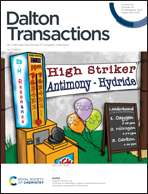Single-molecule magnet behavior in heterolopetic Dy3+-chloro-diazabutadiene complexes: influence of the nuclearity and ligand redox state†
Abstract
We report the synthesis, structure and magnetic properties investigations of a series of new dysprosium heteroleptic mono- and dinuclear complexes based on the association of chloride and different diazabutadiene (DAD2R = [2,6-iPr2C6H3N–CR![[double bond, length as m-dash]](https://www.rsc.org/images/entities/char_e001.gif) CR–NC6H3iPr2-2,6]; R = H, Me) ligands showing different redox states. While using dianionic DAD2R ligands affords the formation of dichloro-bridged dinuclear complexes [Dy2(DAD2R)(μ-Cl)2(THF)2] (R = H (1), Me (2)), two different mononuclear complexes of general formula [DyCl2(DAD2R)(THF)2] (R = H (3), Me (4)) could be obtained with either a radical monoanionic and a monoanionic DAD2R state, respectively. Remarkably, all the complexes exhibit a slow relaxation of their magnetization where the relaxation dynamics depends on both the nuclearity of the system and the DAD2R redox state.
CR–NC6H3iPr2-2,6]; R = H, Me) ligands showing different redox states. While using dianionic DAD2R ligands affords the formation of dichloro-bridged dinuclear complexes [Dy2(DAD2R)(μ-Cl)2(THF)2] (R = H (1), Me (2)), two different mononuclear complexes of general formula [DyCl2(DAD2R)(THF)2] (R = H (3), Me (4)) could be obtained with either a radical monoanionic and a monoanionic DAD2R state, respectively. Remarkably, all the complexes exhibit a slow relaxation of their magnetization where the relaxation dynamics depends on both the nuclearity of the system and the DAD2R redox state.



 Please wait while we load your content...
Please wait while we load your content...